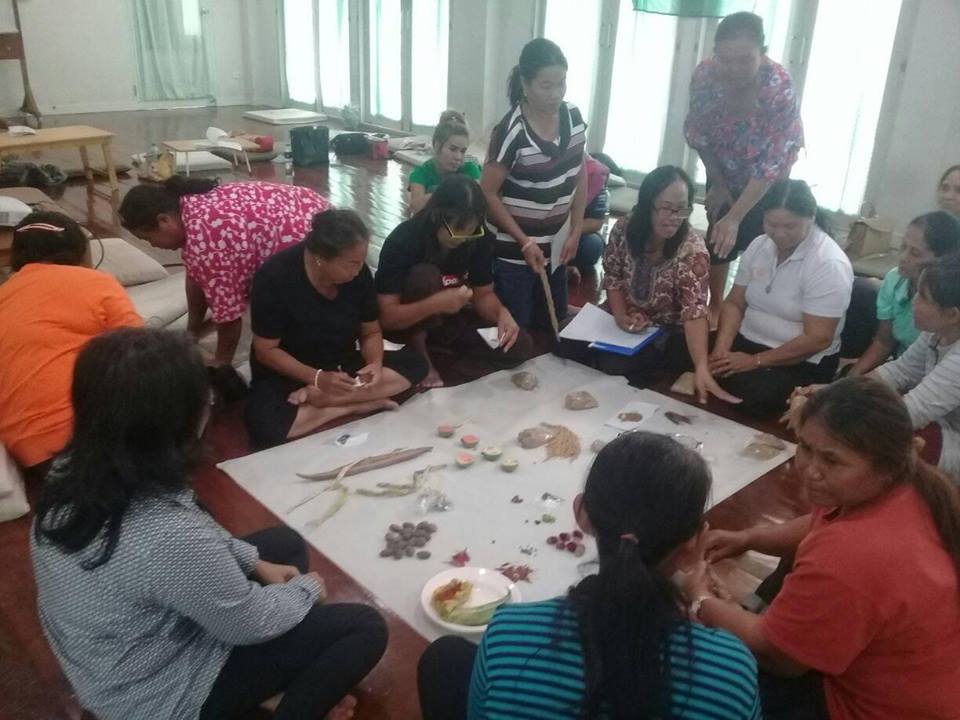Thailand – Thai peasant women used to play a significant role as keepers of native seeds. With this, they could ensure sufficient and diverse food supply for their family and community. But modern agriculture encourages peasants to use commercial seeds instead of native ones. The native seeds diversity is disappearing because only a few varieties are marketed.
Now, agribusiness corporates take over seed production. Seeds are privatized, commercialized, and controlled by them. The corporate seeds are sterile, some are genetically modified, and cannot be regrown. Keeping and exchanging them had been criminalized. The loss of native seeds happens speedily everywhere. The women peasants’ traditional role is therefore fading.











The link between peasant women and native seeds is close and clear. To revive the native seeds is to restore the significance of women farmers and to empower them. So a workshop on Women and Native Seeds was organized with the Women’s Seed Party. Thirty (30) peasant women from the Assembly of the Poor (AOP) attended the workshop.
In the Women’s Seed Party activity, the women brought food ingredients such as native and wild varieties of rice, vegetables, fruits, spices, herbs, and fish, that they grow in and get from the farms, gardens, village, forests, mountains, and rivers, to cook local dishes and eat together. The women talked about the ingredients of their dish, the taste, the medicinal benefit, how, when, and where to grow, how to cook them as well as their role and rights to protect the food and the community agrarian resources. They also brought seeds of native and wild food plants for exchange.
This celebration part of the workshop is a concrete and fun way to show the significance of native food genetics conserved by the women. It is a new way of learning for them in addition to the workshop topics about the threats against the native seeds.
Cooking local dishes from native food ingredients shows the tangible benefits of the peasant women’s struggles for the rights to land, forests, and rivers. They become more committed as they recognize that their struggles mean the effort to keep native food genetic resources which is extremely fundamental to their community, production, tradition, culture, daily well-being, and food sovereignty.
The sharing of recipes also reflects the richness of the food culture in different parts of Thailand. The food culture which is diverse, seasonal, and healthy is another front to fight for good, affordable, and accessible food and against the homogenous and processed food made by the industry and sold by hypermarket chains.
The large inventory of the local food biodiversity and other native plants also helps the peasants to fight against the impacts of the climate change crisis. They will have numerous choices of plant varieties to grow in the fluctuated climate and situations that are resistant to drought, flood, heat, pests, and diseases.
It helped that in Thai communities, many peasant women still hold knowledge about the native food genetic resources and preserve them by saving seeds, growing, and eating them. They will even be stronger when their role as seed guardians is revitalized. Many varieties of native food biodiversity are still available, particularly those of rice, vegetables, fruits, forest products, herbs, medicinal herbs, spices, and fish. In addition to this, AOP has many allies who are active in the preservation of native plant genetic resources.
Peasant women hold enormous strength to fight for peasants’ rights, including rights to land, rights to seeds and biodiversity, rights of peasant women, and rights to the production method. The struggles at the grassroots are inseparable from external and international influences, so peasant women must be empowered to address the issues of native food genetic resources at all levels. Favorable laws and policies are needed to encourage peasant women to continue preserving native seeds and native food genetic resources.
AOP recommends that the laws and policies in favor of the peasants’ seed system to protect, preserve, breed, select, multiply, use and market the native food genetic resources be issued with the consultation of peasants. Peasant-to-peasant education empowers peasant women to use, preserve, protect, document, make the community database and seed bank of the native food genetic resources must be supported. Food, agriculture, and food genetic resources must not be included in any free trade agenda. And lastly, the UN Declaration on Peasants’ rights must be passed and must be disseminated, respected, promoted, and realized at all levels.
Activities like the Women’s Seed Party are a creative way to mobilize peasant women. It strengthens the solidarity of peasant women in a creative and joyful way. The impacts can be expanded by including other peasant women’s meetings or workshops. It can be enlarged into an annual festival and invite other peasant women’s organizations to the party. #
About AFOSP-MTCP2
AFOSP-MTCP2 is a capacity building program funded by the European Union (EU) with co-financing from the International Fund for Agricultural Development (IFAD) and the Swiss Agency for Development and Cooperation (SDC). The program is being implemented in seven ASEAN countries through the consortium Asian Farmers’ Association for Sustainable Rural Development (AFA) and La Via Campesina (LVC). AFOSP-MTCP2 supports the strengthening of national farmers’ organizations (FOs) and their national platform towards improving their institutional capacity to deliver economic services to their members as well as to effectively engage them in policy processes. At the ASEAN level, the consortium AFA – LVC works in partnership with the ASEAN Foundation in expanding the spaces for the engagement of FOs in ASEAN processes.

Comments are closed